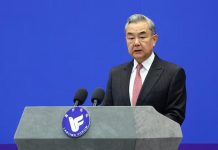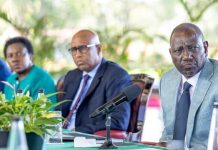Africa-Press – Kenya. There’s little doubt that 2022 has been quite an eventful year where extraordinary events dominated news headlines for days on end. Whereas some of the events were shocking, others were intriguing and largely unexpected.
This article looks back at some of the events and gives a breakdown in no particular order. William Ruto beats Raila Odinga, becomes Kenya’s fifth President This is by far the biggest news story that dominated headlines in the local media given the odds were largely stuck up against the Deputy President.
With all major opinion polls giving him an edge against the DP and state machinery backing his bid, many expected Raila to easily cruise to victory in the August 9 polls, but he lost.
Ruto won with 7,176,141 votes (50.49%) against Raila’s 6,942,930 votes (48.85%) but the Azimio leader rejected the results and filed a petition at the Supreme Court.
A seven-judge bench of the apex court, however, upheld Ruto’s win citing lack of sufficient evidence to warrant the nullification of the presidential results.
While delivering the verdict on September 5 to an expectant country, Chief Justice Martha Koome was cold and raw in her description of the evidence presented before the court.
She said it was no more than hot air, was based on hearsay and used a string of unkind adjectives to describe how the Azimio team took judges on a wild goose chase with a truckload of forged evidence that produced nothing of probative value.
Raila has nonetheless maintained that his victory was stolen and recently called for prosecution of IEBC chair Wafula Chebukati whom he accuses of bungling the August polls.
He has told his supporters he will announce his next political move in January. Retired President Mwai Kibaki’s death On Friday, April 22, Kenyans got the shocking news that Kenya’s 3rd President Mwai Kibaki was dead.
His successor Uhuru Kenyatta declared a national mourning period with flags flying at half-mast until Kibaki’s burial. Kibaki, who ended President Daniel Moi’s 24-year rule, died aged 90. Kenyans from across the political divide expressed a real sense of loss as Kibaki was considered Kenya’s best-ever president.
A sharp economist with vast experience in civil service spanning several decades, Kibaki was credited for setting the country on an upward economic trajectory underscored by mega infrastructural projects like the Thika Superhighway.
The lowest point of his presidency was the 2007/08 election violence that rocked the country after a disputed vote for his reelection led to the loss of over 1,200 lives.
His biggest failure? Corruption. His government was rocked by major corruption scandals with the Sh158.3 billion Goldenberg scam topping the list. Kibaki was buried at his rural home in Othaya on April 30 in a state funeral with full military honours.
Russia’s invasion of Ukraine President Vladimir Putin’s display of apparent lack of remorse for his unethical decisions and dictatorial tendencies went a notch higher on February 24 when he invaded neighbouring Ukraine in a bid to forcefully take over the country.
A man known for his commanding demeanour and confident assertiveness the world over, Putin started the war by saying he wanted to demilitarise Ukraine with the main objective of preventing it from joining NATO. The invasion surprised many people, and despite several sanctions by major economies, Russia’s military action in Ukraine has continued unabated.
Putin, voted the world’s most powerful person four times between 2013 and 2016, remains committed to his resolve to take over Ukraine even as the takeover appears doomed with Ukraine regaining control of most captured cities including the capital, Kyiv.
The conflict has to date resulted in mass casualties with the UN High Commissioner for Human Rights putting civilian casualties at 6,595 as of November 20. Queen Elizabeth’s death
This made international headlines for obvious reasons. At 96, Queen Elizabeth II had been a constant presence in millions of lives and her death affected people beyond UK borders. She was the longest-serving monarch in British history, having become queen in 1952 at the age of 25 while on tour in Kenya.
Her death on September 8 marked the start of a new era for the UK, especially coming at a turbulent time in British politics; scandal-induced change of prime minister and soaring energy and food prices.
And the fact that she died in Scotland rather than in England, triggered changes in official protocols for her funeral ceremony. African heads of state, for instance, were driven to the funeral service in a bus in stark contrast to the chauffeured limousine entourages synonymous with such high-level events.
After 70 years on the throne, the queen will be remembered for many things but none more so than her calm demeanour and royal elegance. Her official death certificate, which did not note any contributing factors, said she died of “old age”.
Miguna Miguna’s return to Kenya After over four years since his forceful deportation to Canada by the Jubilee regime in March 2018, lawyer Miguna Miguna finally returned home on October 20.
Miguna jetted back into the country to a low profile reception in stuck contrast to a grand arrival the media had hyped weeks before the D-day. The controversial self-proclaimed NRM General was thankful to Kenyans for voting for the Kenya Kwanza administration without which his travel back home, he said, could never have happened.
He extended gratitude to President Ruto whom he said personally ensured a new passport was delivered to him in Canada to enable his travel. Prior to this, Miguna who holds both Kenyan and Canadian citizenship had remained holed up in Toronto unable to travel back home due to the red alerts the Jubilee administration had imposed on him.
Miguna has maintained a low profile since his return but his signature rants online targeted at his enemies, real or imagined, have continued unabated.
GMO ban lifted This by far remains the most recent headline banger going by the controversy it has generated in the country. It all began with the lifting of the decade-long ban on genetically modified crops on October 3 by President William Ruto.
He said the move was guided by the recommendation of the Task Force on the Review Matters Relating to Genetically Modified Foods and Food Safety. The decision caused an outcry from Kenyans with politicians and civil rights groups leading the protests.
Other than fears that GMO foods can lead to cancer and other health complications, farmers were concerned over plans to import 10 million bags of duty-free GMO maize at a time they were still harvesting their produce.
The importation, they argued, would lower prices of locally produced maize leading to massive losses. The court heard their cries and on November 28 issued an injunction against the importation of GMO maize.
Agriculture CS Mithika Linturi on the same day distanced the government from Trade CS Moses Kuria’s remarks that insinuated that the government was hellbent on importing GMOs well aware of the health implications.
Linturi said the mandate of determining the maize deficit in the country is vested in his ministry and not in Kuria’s docket. The government has since gazetted the importation of 900,000 metric tonnes of maize from February 1, 2023.
For More News And Analysis About Kenya Follow Africa-Press






